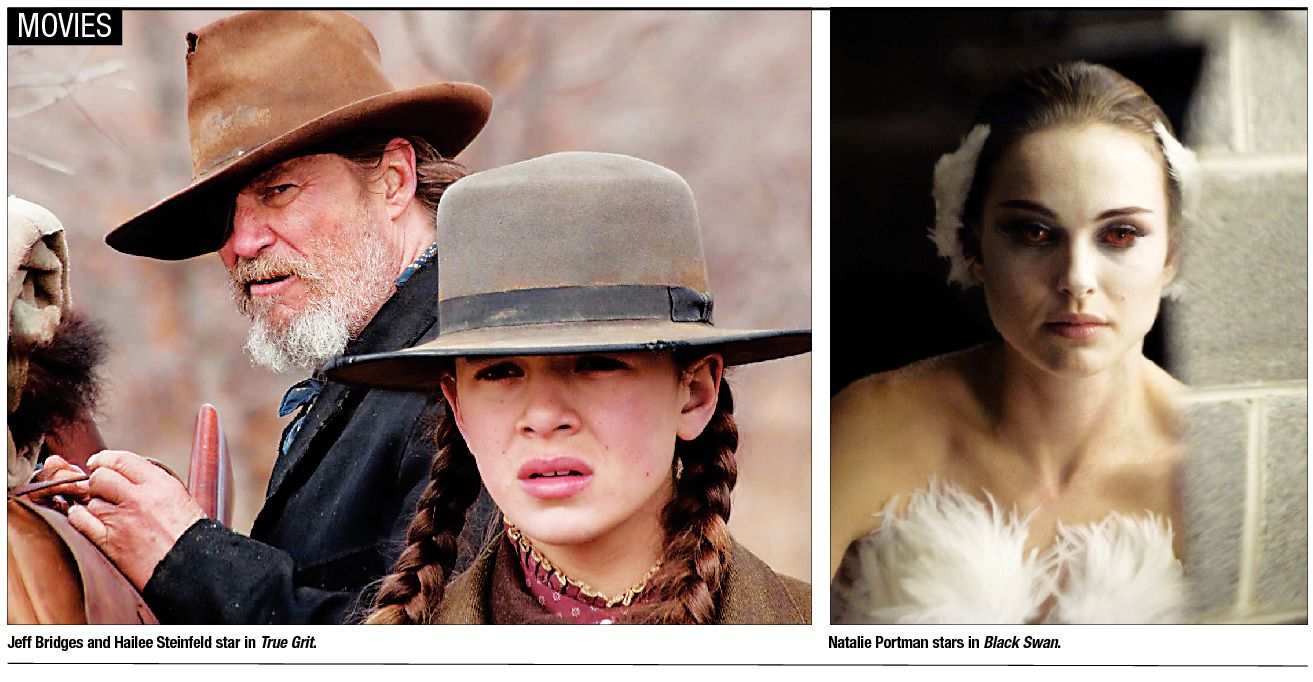
A weekend of holiday movies
FILM | Chuck Koplinski
Dude trumps The Duke in Grit-ier remake
While most filmmakers would shy away from remaking a beloved American film, Joel and Ethan Coen, as well as actor Jeff Bridges, eagerly put their own stamp on Charles Portis’ True Grit. Theirs is a more realistic and ultimately more successful take on the story than Henry Hathaway’s 1969 version featuring John Wayne’s Oscar-winning turn. I realize some will consider this statement blasphemy and in some senses you could argue that comparing these two movies is akin to doing the same with apples and oranges. Yet different eras produce different takes on stories and the Coens’ more violent and grounded interpretation is befitting the audiences of today. It is far more honest in its treatment of its characters and the times they inhabit.
Though only 14 years old, Mattie Ross (Hailee Steinfeld) is nobody’s fool and has more sand than many men she encounters in Fort Smith, Ark., in 1880. There to settle the affairs surrounding the murder of her father, she hires Marshall Reuben Cogburn (Bridges) to help her track down the man responsible, Tom Chaney (Josh Brolin). Though she’s been told that “fear doesn’t enter into his thinking,” her first encounter with the lawman is less than auspicious as he dismisses her out of hand. Still, Mattie’s tenacity impresses the Marshall and Texas Ranger LaBoeuf (Matt Damon) who’s also on Chaney’s trail in an effort to collect a bounty on his head for having killed a Texas state senator. This contentious trio head into the Indian Territory to hunt down Chaney, who is rumored to have joined Ned Pepper (Barry Pepper), an outlaw Cogburn knows all too well.
The Coens immediately grab you with the film’s epic emotional sweep and elegiac look at this bygone era. Suffused with period music, shot on wonderfully authentic sets and composed of long takes to let us drink it all in, the film is something of a time capsule in which we are given a glimpse of the past. While the Coens cast a romantic spell on the viewer during the film’s first act in Fort Smith, as the characters go deeper and deeper into the wilderness, they accentuate how raw and dangerous the environment is, which is reflected by the flinty characters with whom we’re keeping company.
Perhaps the most enjoyable element of the film is its language. Sporting large sections from Portis’ novel, as adapted by the Coens there’s a formality to the dialogue that’s intelligent, poetic and a joy to listen to. Pay particular note to the scene in which Mattie negotiates with a horse trader early on, or our first encounter with Cogburn as he’s giving testimony at a murder trial. These common folks convey themselves with a rhythmic cadence and pointed, smart language that’s a wonder to behold and illicits a sense of nostalgia for a time in which such things were held as important.
It’s no surprise that Bridges and Damon do fine jobs in their roles. These two couldn’t give a bad performance if their lives depended on it. Bringing realism to their characters is in their bones and they don’t disappoint. However, the revelation here is Steinfeld who, like her character, goes toe-to-toe with these master thespians and holds her own. You utterly believe in the strength, determination and, at times, innocence Mattie projects and it’s to the young actress’ credit that we can’t take our eyes off her.
There’s a majesty at play in True Grit wholly unique from any other film released this year. The Coens have succeeded in making an instant classic in a genre that, like the era it portrays, has been forgotten by many. They generate a sense of longing for the old-fashioned ideals True Grit contains, a time when taking matters into your own hands and accepting responsibility for your actions was the norm as opposed to the exception to the rule.
Swan, a compelling dance of madness
Director Darren Aronofsky has always gone out of his way to push our buttons. His latest project, the psychological horror film Black Swan, is no exception. Following one woman’s descent into madness as she attempts to conquer one of the most difficult roles in the ballet world, the filmmaker bombards the viewer with a wide variety of themes in a shamelessly manipulative manner that’s initially intriguing and at times a bit frustrating. While Aronofsky telegraphs his intent far too early, robbing the film of some of its suspense, the end result proves haunting.
Nina Sayers (Natalie Portman) is a young woman whose emotional development has been arrested by an overly protective mother (Barbara Hershey) yet finds herself on the back end of a ballet career that has yet to pay off with the degree of recognition her hard work deserves. That could potentially change as the company she belongs to is set to tackle Tchaikovsky’s Black Swan, an oft-done piece, but a challenging one for the dancer who gets the title role. That’s because she must inhabit two roles – that of a virginal princess and also her darker doppelganger. The progressive director of the company, Thomas (Vincent Cassel), is sure he can bring something new in his production but the key is finding the perfect dancer to build it around. Will it be Nina or the newcomer, Lily (Mila Kunis), whose addition to the company is more than a little suspect?
As Nina begins to crack under the pressure her mother puts on her to succeed, Aronofsky begins to pull out all of the stops in showing how her mind is beginning to fracture.